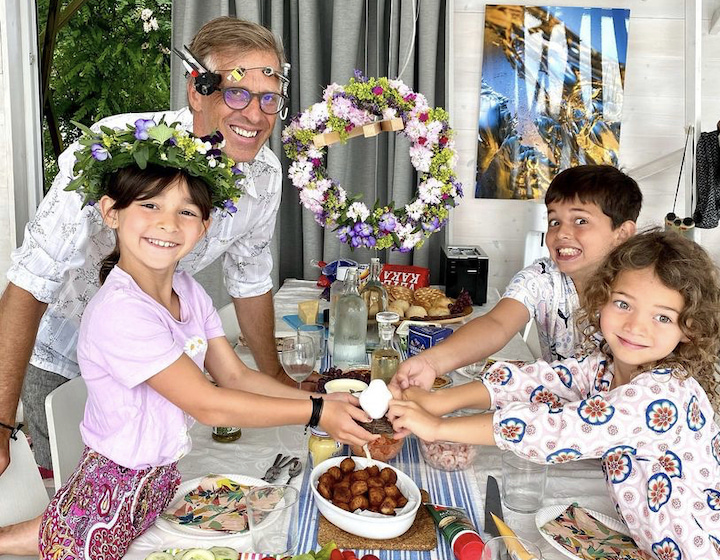
Fredrik Haren talks about why he started homeschooling his three kids, how his novel came to him fully formed in a dream at 2am, and reframing parenting to overcome challenges!
How many dads out there actually own an island? Now how many of them own three (one of which you can ‘rent’ for free if you’re lucky)? Our ‘Cool Dad’ of the month is Fredrik Haren, father of three, owner of islands, global speaker and novelist. Fredrik has been living in Singapore for 14 years and he and his wife Elaine homeschool their three kids (Lucas 11, Maria 8 and Sophia 6). Fredrik has also authored 10 books – including business book ‘The Idea Book’ which was included in ‘The 100 Best Business Books Of All Time’ and the recently launched ‘The Unvisible’, a novel about an invisible human race which went straight to #1 on Amazon.sg. We chat to Fredrik about homeschooling, his hands-on approach to parenting, and how exactly we can put our name in the hat to get a chance at renting out that island of his!
Read more Cool Dad features here!
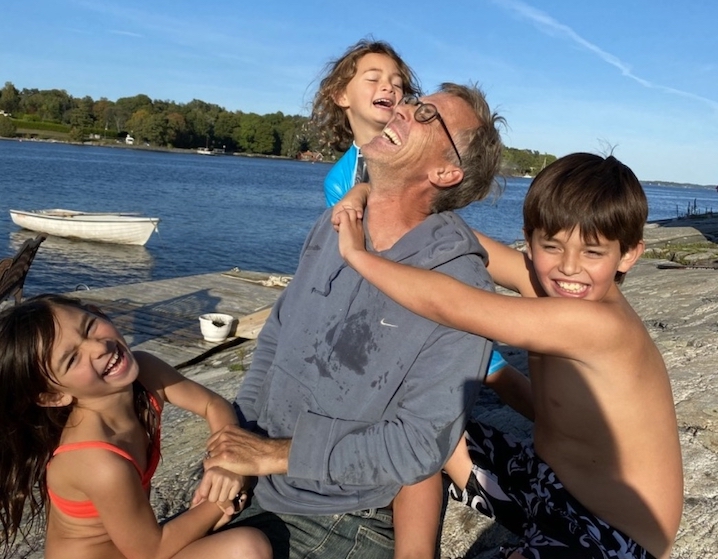
Where are you from and how long have you been living in Singapore?
I am a 53-year-old man from Sweden who moved to Asia in 2005 (Beijing) and then to Singapore in 2008.
Tell us something crazy/quirky about yourself!
I am an island man. I own three islands (one in the Philippines, and two in Stockholm, Sweden.) We live on one island in the summer and one island I lend out (for free) to creative people who want to sit on an island and work on a creative project (that island is www.IdeasIsland.com).
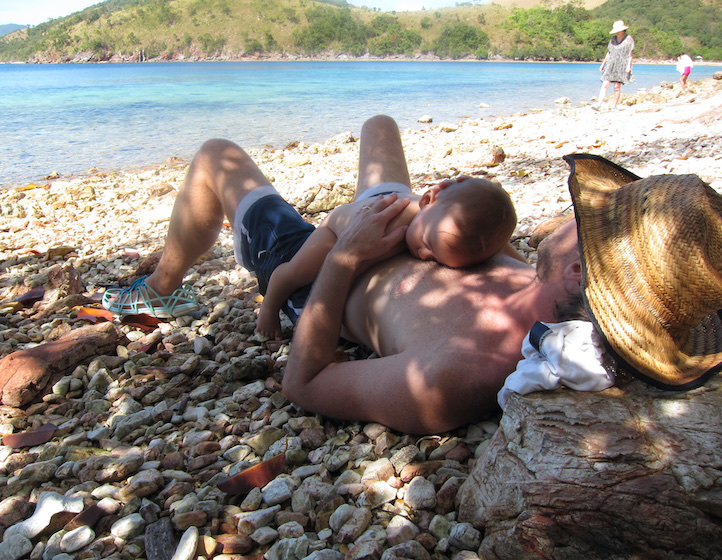
Wow, owning an island sounds like the dream! How did you manage this?
Some people invest in gold or bitcoin or stocks – I find that very boring – I find islands much more fun 🙂 In Sweden we have 200 000 islands so anyone who is able to, can buy one. There are not that many islands close and central to Stockholm but I am happy to own two of the ten most central islands in Stockholm.
What are the best things about living in Singapore?
The obvious – but true – answers are safety, convenience and multi-culturalism. I cannot think of a country where I would worry less, be less stressed and more inspired by different cultures than as a parent in Singapore.
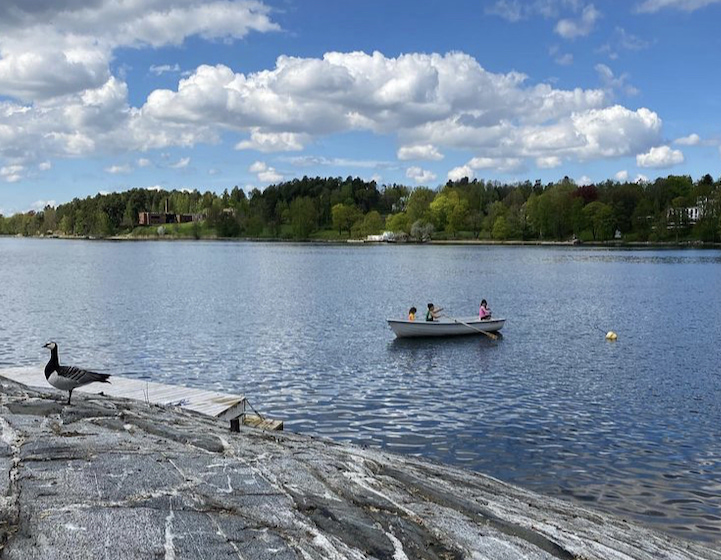
What do you miss from your home country?
Swedish summers are the best, and we normally go back every summer to experience it. But in 2020 Covid stopped us from that and that really hurt. It hurt so much that in 2021 we decided to go back to Sweden and stay there for 6 months to “compensate” for not being able to go back in 2020.
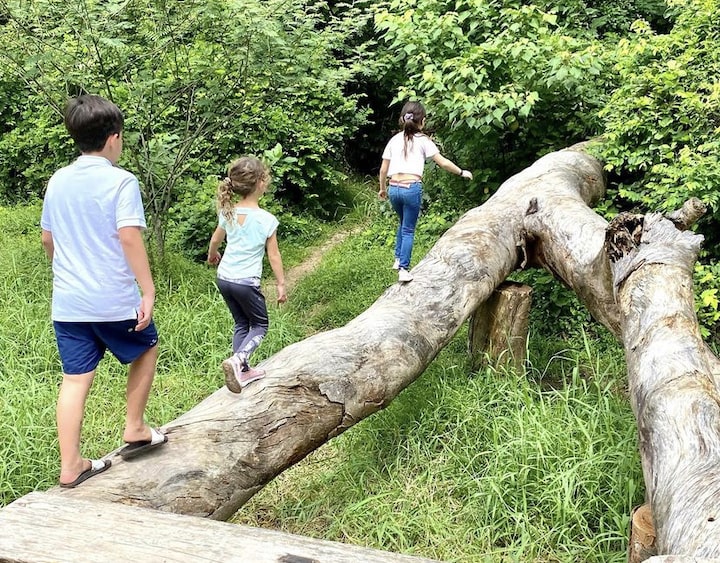
You and your wife homeschool your children – tell us about this experience.
The initial idea to homeschool came because we thought that Singapore would go into a big lockdown and all kids would be doing home-based learning anyway so why pay all those school fees and then end up with the kids at home anyway? But when we started homeschooling we quickly realised that it’s a wonderful way of getting more time with our kids when they are young. (Especially since I, due to Covid, did not travel like I used to.) We love how independent the kids have become and how flexible our lives have become (we can now choose to go to Wild Wild Wet on a Friday and then do school on a Saturday for example and skip all the queues.)
The challenge is to make sure the kids get enough social interaction with other kids and we spend a lot of time organising playdates, sleep-overs and small group activities for homeschooling with other kids.
I do not think we will homeschool forever but I am very happy we did it for a few years – especially during Covid. The first thing we said when Covid hit was “Our children are going to remember the Covid years as some of the most fun years of their lives”. And I think they will. Because we homeschooled we could go and live on our island for 6 months for example.
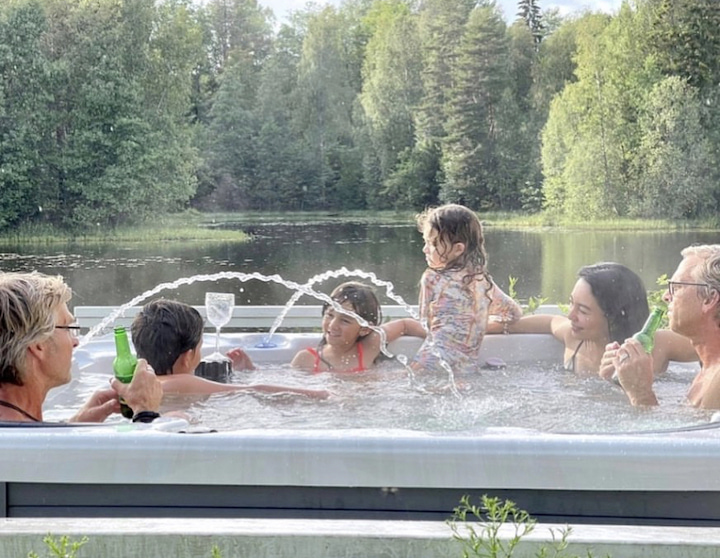
What’s your parenting philosophy?
“Parenting is not hard.” (Don’t get me wrong, parenting is a huge undertaking and there are so many things to worry, stress and think about – but I do not think it helps to concentrate on all the things that make it hard. So I tell myself it’s easy. I think we can more easily overcome big challenges with a mindset of “I can do this”. And it’s easier to think you can do something if you do not look at it as being “too hard”. And we have had some big parenting challenges in our family, but I am proud of how we overcame them and I think the approach of looking at parenting as being “not hard” helped.
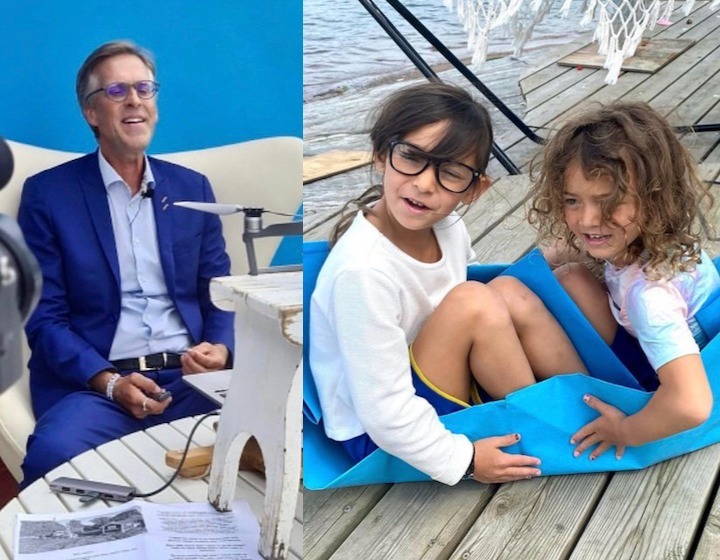
Given you are a keynote speaker how do you inspire confidence in your children?
I am not sure being a keynote speaker has told me anything about that. But as a coach I have coached hundreds of adults on how to find clarity in their lives, and while doing that learnt a lot about what adults look back to in their childhood and what creates trauma in them. And one thing that has hit me is how common it is for adults to say to me “My parents never told me they loved me….” followed by some explanation of why they are not happy/successful/relaxed/harmonious etc. I have been thinking a lot about that. We tell our kids we love them all the time! Actually, any time I feel “oh, god I love these kids” I say it.
Some might think that is overdoing it, but I really do not think you can overdo showing affection and love to a child. I think it is really really hard to say “I love you” TOO many times to a child.
You have a few non-fiction books under your belt but you just published your first fiction book – congratulations! Tell us about ‘The Unvisible’ – we hear the story came to you fully developed at 2 am in Bangkok!
Yes, I dreamt this story! I dreamt the characters, the story, the conflict, even their names! It was no ordinary dream, it came to me as a message that I had to interpret and deliver to the world. I know it might sound grand, but the message in The Unvisible is what I was born to deliver. It’s a book about an invisible human race, but really it’s a story about what it means to be human.
We understand your middle child had invisible friends. How did you navigate this?
Yes, Maria – now 8 – had a number of invisible friends until she was 5. We knew it was not uncommon (about 5% of children are said to have some kind of invisible friends) and we knew she would grow out of it, so we just treated it as something “normal” and kept asking questions about her friends. Then one day they were not there anymore. (But in my novel The Unvisible I turned the concept of invisible friends into a fact that young children can see an invisible human race, but that adults do not believe what the children see and just call it “imaginary friends”.)
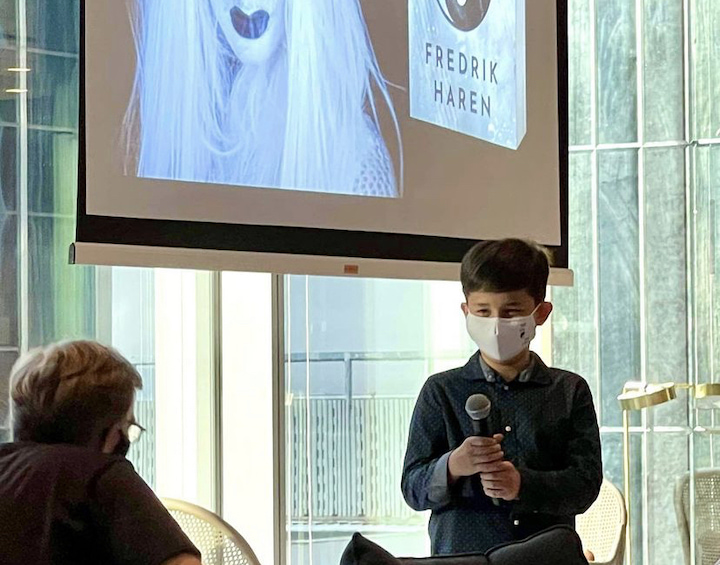
Your whole family got involved with your book launch, your wife helped with the marketing, your son emceed the book launch and we hear your daughter looked after merchandising. How do you encourage entrepreneurship in your kids?
My wife helped me with so many things from branding to contacts to being my biggest fan. And yes, I did include my kids as well. My son rocked it as an emcee and my daughters created epic “merch” (You can see it on www.TheUnvisible.com) My father was a musician and he would put me on stage as a 5-year-old to sing a song or two and it would build my competence and get me excited for being on a stage. (Years later I became a professional speaker…)
I think the best way to encourage entrepreneurship in kids is to just involve them in your own projects. Kids love to be involved. One of my best parenting tips is to “just say ‘yes’.” Kids have so many ideas and they want to create things. So when they have an idea for something they want to do, we just say “sure”. Right now Maria is building a computer game on Roblox on the theme of The Unvisible. It takes forever, but it’s epic that my novel will have a computer game! It matters less if that game is great or not. What matters is that Maria feels she is helping her dad, and that her dad listens to her ideas.
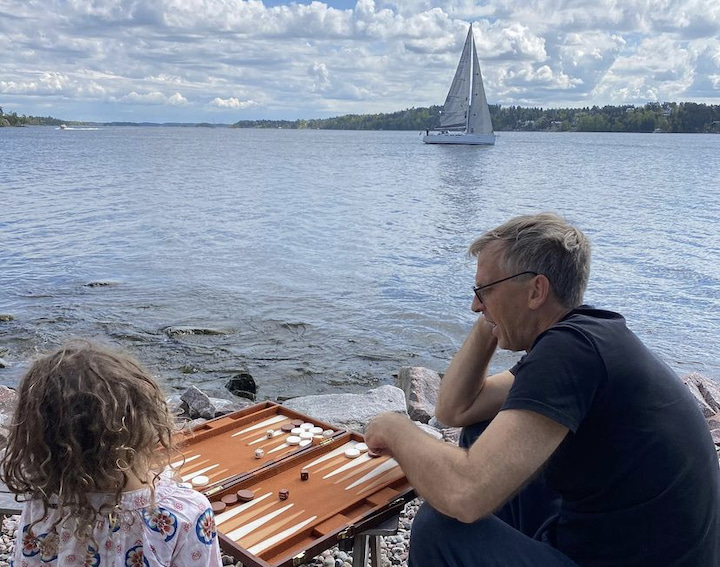
What’s your favourite one-on-one activity with each child?
For my son: Play chess. We play on the chess.com app and he beats me 50% of the time! He loves to analyse the game with me. (Oh, and of course anything Soccer, talking about it, watching it, researching it.)
My oldest daughter: creating desserts without recipes. She loves to “experiment” in the kitchen and I am a terrible chef, so we are on the same level and we just make crazy desserts, like “what will happen if we put melted sugar on marshmallows? Let’s try!”
For my youngest I actually just let her decide what she wants to do with me. She is such a creative and strong-willed young human that I just go with the flow of whatever idea she has in her head at the moment.
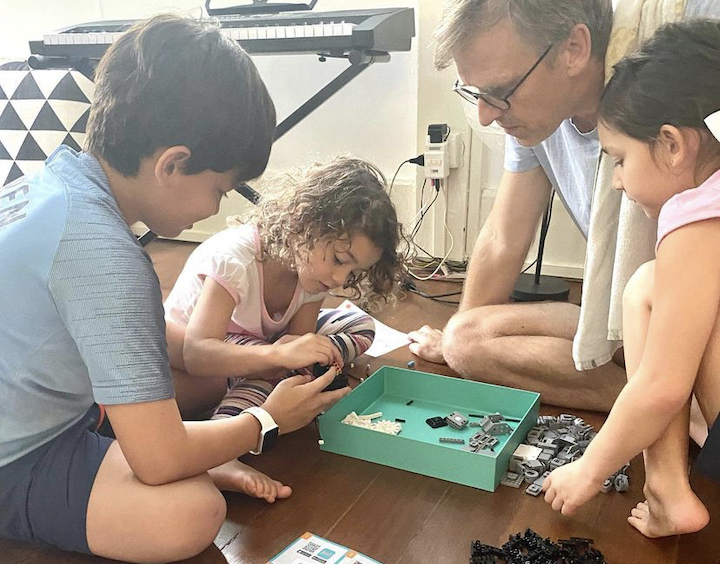
What advice do you give your children about finding their passion?
My mother was a Montessori teacher and one of the things I like about Montessori is how they use whatever a child is interested in to teach whatever a child needs to learn. In short: If the teacher wants the child to practice reading and the child wants to play with dinosaurs the teacher will say “Let’s read a book about dinosaurs”. If the teacher instead wants the child to learn drawing she will say: “Let’s draw dinosaurs!” etc.
So my son is passionate about football (soccer) so we will introduce the idea of spreadsheets to him by showing how you can create a practical way of keeping track of his football predictions etc. That way one passion leads to another.
Many thanks, Fredrik, it has been so interesting hearing about your parenting ideas and positive take on life. I can’t wait to read your latest book!






 View All
View All





 View All
View All








 View All
View All




